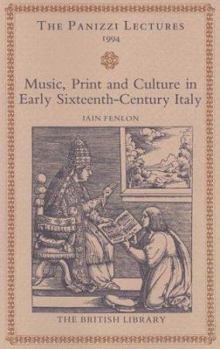Music, Print and Culture in Early 16th Century Italy
During the early years of the sixteenth century, the reproduction of music of all kinds began to move from the copyist's desk to the printer's workshop. As Francis Bacon, viewing the development from the safe distance of the early seventeenth century, memorably observed in a more general context, the arrival of the printed book had altered 'the appearance and state of the whole world.' By the middle of the sixteenth century, not only music itself, but associated treatises, text books, instruction manuals, and tutors were being produced in their thousands to cater for a growing audience in the larger urban centres of Renaissance Italy. By making available hundreds of copies of works which previously had had only a limited circulation in manuscript, the press made a dramatic difference to the accessibility, dissemination, and transmission of music. In this illustrated study, Iain Fenlon examines the impact of the spread of printing on the publication of music in early sixteenth-century Italy, the place where the first collections of polyphonic music were printed and where the market for those books was originally created.
Format:Paperback
Language:English
ISBN:0712304126
ISBN13:9780712304122
Release Date:March 1996
Publisher:British Library
Length:95 Pages
Weight:0.50 lbs.
Dimensions:1.0" x 8.4" x 5.4"
Customer Reviews
0 rating





